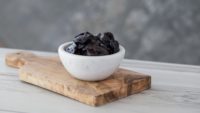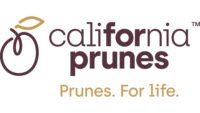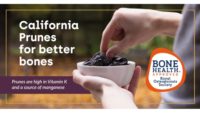New research published in Nutrients journal provides evidence that prunes are a prebiotic food that reverses bone loss in mice. The study investigators found that carbohydrates and polyphenols in prunes act as prebiotics and help restore bone health.[i]
“Both the carbohydrate component and the polyphenols within the prunes altered the gut microbiota and were associated with positive effects on bone, namely restoring bone. By definition, prebiotics are substrates that alter the composition or activity of the microbiota and confer benefits to the health of the individual,” explained Principal Investigator Brenda Smith, PhD, professor at the Indiana University School of Medicine. In this case the benefit conferred was the restoration of bone loss.
In previous studies, prunes have been found to stimulate favorable gut microbiota changes and to protect bone health. Those effects have largely been attributed to their polyphenolic compounds; however, the exact mechanisms and contribution of other important nutrients, such as carbohydrates, have been unclear.
In this study, researchers isolated the polyphenol (PP) compounds as well as the carbohydrates (CHO) from prunes and fed them to two separate groups of estrogen-deficient, female mice with substantial bone loss for 5- and 10-week durations. For comparison, three additional groups of the mice were assigned to diets either containing whole prunes, a prune crude extract with both PP and CHO prune components, or a diet consisting of no prunes or prune components, which served as the control group. All diets were comparable in macronutrients.
Compared to the mice who did not consume any prune or prune component, those who consumed isolated CHO, isolated PP, prune crude extract, or whole prunes experienced restored bone previously lost. These mice also showed a significant increase in short chain fatty acid (SCFA) production in their guts, as well favorable changes to their gut microbiota. In particular, researchers saw increases in SCFAs n-butyrate and propionate, which are thought to be most effective at preventing bone loss by suppressing biomarkers associated with bone breakdown. These observations suggest that prunes and prune components may affect the gut in a manner that contributes to improved mineral absorption, immune system processes, and the gut barrier’s integrity—all of which can affect hormones, metabolites, and immune cells that play a role in bone health.
The researchers also reported that the CHO independently showed the ability to restore bone early in the study while the effect of the PP on bone became evident and more important later.
“Even though we think they’re both having prebiotic activity, those prebiotics are probably occurring by different mechanisms,” said Smith. She added that her findings make a strong case for consuming whole prunes “because you’re getting some of the benefit from the carbohydrate in the short term, and the long-term benefit from the polyphenols.”
Smith noted that the vitamins, minerals, and plant compounds in prunes may also contribute to the bone and the gut benefits. This research gets us closer to understanding the unique attributes of prunes while underscoring the importance of eating the fruit in its entirety.
This study is one of several recent or current studies that are further exploring the benefits of prunes and their specific components on different health conditions. Additional studies that will be presented or published in the near term will investigate the relationship between prune consumption and inflammation in postmenopausal women, glucocorticoid-induced osteoporosis in mice, and colon cancer suppression in rats. These studies are expected to build upon the existing body of evidence that points to prunes as a bone- and gut- supportive food.
Access the full study here.
[i] Smith BJ, Hatter B, Washburn K, Graef-Downard J, Ojo BA, El-Rassi GD, Cichewicz RH, Payton M, Lucas EA. Dried Plum's Polyphenolic Compounds and Carbohydrates Contribute to Its Osteoprotective Effects and Exhibit Prebiotic Activity in Estrogen Deficient C57BL/6 Mice. Nutrients. 2022 Apr 19;14(9):1685.




